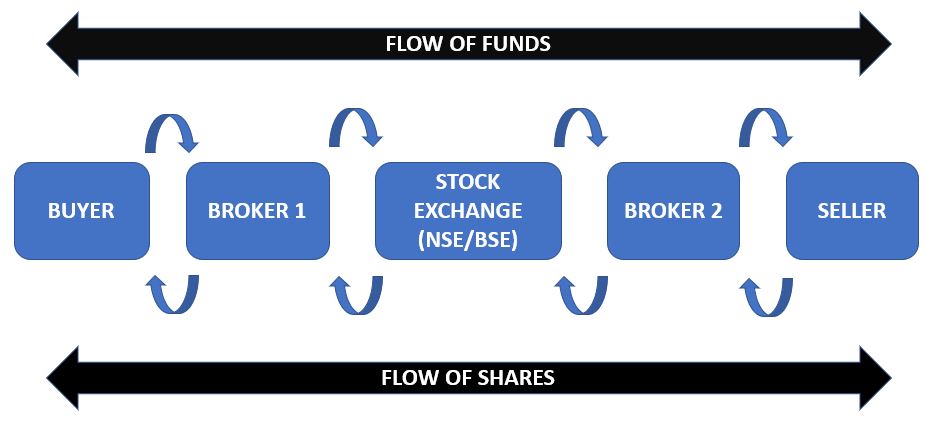Know About Stock Markets and Trading Mechanism in Stock Exchange
The stock market can easily be regarded as one of the most sough after platforms

The stock market can easily be regarded as one of the most sough after platforms for creating wealth. But it has often been noted that the thought of investing in stocks scares off individuals because of the risks which are associated with this market. Well, there is no denying the fact that the stock markets do come with risks, but it must also be noted that when approached with discipline, the stock market is one of the best ways to create some wealth.
As the name suggests, stock market is the market where stocks of various companies are traded. Stocks or Shares or equities all mean the same. The stock market provides a platform to traders and investors for trading in these securities to extract some profits. Depending upon your investment goal and risk appetite you can choose your trade or invest for short term or long term. However, you can even practice intraday trade and carry out daily buying and selling for extracting profits from small market movements.
There are various other assets which are also traded on the stock market like bonds and derivatives. All the trades in the stock market are facilitated by the stock exchanges. The exchanges are the main intermediary bodies which establish a connection between the buyer and seller.
Let us now discuss about the main participants and working of the stock market in India.
Table of Content
Stock Market & Trading Mechanism in Stock Exchange
- Participants in the Stock Market
- Securities and Exchange Board of India (SEBI)
- Stock Exchanges
- Broking Houses
- Traders and Investors
- Trading Mechanism in Stock Exchange
So, without further ado, let us discuss about the main stock market participants and also discuss about the trading mechanism in the market.
1. Participants in the Stock Market:
Buyers and sellers are the essential constituent of any type of market, but the Stock Market is a bit different. Of-course buyers and sellers exist here as well, but there are various other entities involved here too. Let us discuss about all the participants of the stock market in detail.
- Securities and Exchange Board of India (SEBI): SEBI is the main regulatory body which keeps an eye on the functioning of the stock markets in India. It is a government body and is responsible for laying down all the necessary framework and regulations required for the smooth and fair functioning of the markets. All the other bodies in the market have to comply with SEBI and abide all the regulations to protect the investor’s interest.
- Stock Exchanges: All the trading in the stock market is facilitated by the stock exchanges. It is the main intermediary body which connects buyers and sellers. The two most prominent stock exchanges in India are the National Stock Exchange (NSE) and Bombay Stock Exchange (BSE). However, you cannot directly approach a stock exchange for trading.
- Broking Houses: These are the bodies which help investors trade on the exchanges. To trade on any of the nationalized stock exchange you need to take the help of a stockbroker. A broker needs to be registered with SEBI in order to trade on the exchange. The broker charges brokerage from you for every trade that you place on the exchange.
- Traders and InvestorsThese are the most important constituents of the stock market. These are the individuals who invest in the stocks or other assets with the aim of extracting profits. You can trade or invest on any of the stock exchange by opening a Demat account.
2. Trading Mechanism in Stock Exchange
Once you have your Demat account and Trading account ready, you are all set to trade in the stock market. Companies list their shares in the Primary Market through an Initial Public Offering Or IPO. After the IPO the stocks of the company are listed on an exchange and are available for trading in the secondary market.
Stocks of companies are traded in order to make profits or cut down losses. This trading of stocks is carried out through a stockbroker or brokerage firm. These brokers act as an intermediary body between you and the stock exchange.

Whenever you want to buy and trade a stock, you place the order with your broker at a fixed price. The broker passes on the order to the stock exchange. The exchange then searches for availability of buyer or seller to execute the order at the instructed price. If the order is completed the exchange communicated with the broker that the order has been executed.
The stock exchanges keep record of all the details of buyers and sellers trading on the exchange through the brokers to avoid any chance of default. The stocks are then transferred from the Demat account of the seller to the Demat account of the buyer electronically. The settlement process earlier used to take weeks, but the electronic settlement and introduction of Demat has made it possible to carry out all settlements in T+2 days.
Conclusion
The Indian Capital Markets are one of the most sought-after platforms for investment and trading. However, they come with their own set of risks. Therefore, it is very important to have an idea about your risk bearing capacity before entering this lucrative world. A risk profile analysis from a SEBI registered investment advisor can help you with the same. Also, it requires lot of knowledge and expertise in the financial markets. If you are new to the Capital Markets, it is better to take the help of a certified investment advisor who can help you by providing you research based recommendations for trading and investing in the markets.







